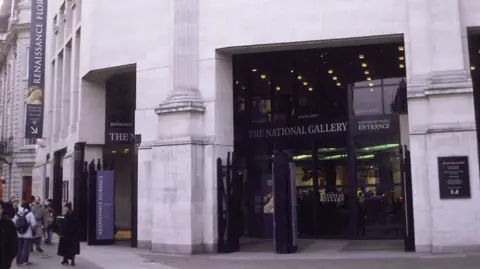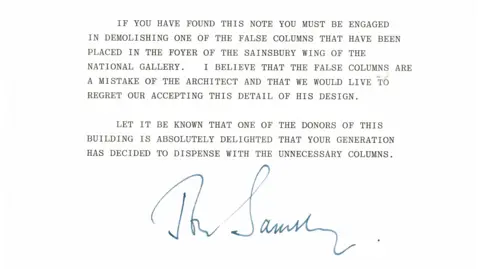National Gallery pillar-hating letter ‘a compromise’
 Getty Images
Getty ImagesA donor’s letter condemning false columns in the National Gallery’s Sainsbury Wing was hidden in one as a compromise, the writer’s son has revealed.
The letter from Lord Sainsbury, who funded the building in 1990, was uncovered during renovations last year.
In it, he wrote that the discovery of the letter meant the “unnecessary” columns were being demolished – which he was “absolutely delighted” about.
Mark Sainsbury told BBC Radio 4’s Today programme that his father and the architects had vehemently disagreed on this element of the design, and his uncle had suggested putting the letter there as a way to keep the peace.

“It was my uncle Simon, I think, that kind of forged the compromise, that Dad get allowed to register his dissatisfaction in the form of this letter,” Mr Sainsbury said.
The pillars were part of a design by American architect Robert Venturi and his professional partner and wife, Denise Scott Brown, for the National Gallery’s Sainsbury Wing.
The design was chosen following the cancellation of a proposed extension to the National Gallery, famously derided as a “monstrous carbuncle” on Trafalgar Square by Prince Charles.
But Lord Sainsbury – a former chair of the supermarket chain – disliked Mr Venturi’s addition of two non-structural columns in the foyer.
 Lord John Sainsbury/ the Sainsbury family
Lord John Sainsbury/ the Sainsbury familyTyped in capitals, on Sainsbury’s letterheaded paper, Lord Sainsbury wrote:
“If you have found this note you must be engaged in demolishing one of the false columns that have been placed in the foyer of the Sainsbury Wing of the National Gallery.
“I believe that the false columns are a mistake of the architect and that we would live to regret our accepting this detail of his design.
“Let it be known that one of the donors of this building is absolutely delighted that your generation has decided to dispense with the unnecessary columns.”
Last year, the gallery began upgrading the Sainsbury Wing.
An £85m plan aims to open up the foyer to deal with vastly increased visitor numbers than had been anticipated in the 1980s.
Lord Sainsbury died two years ago, aged 94.
His widow, Anya Linden, 91, and his daughter were present when the letter was removed from the column.
“It was a really lovely moment actually,” said Mark Sainsbury.
“He was never one to say I told you so, but he would raise an eyebrow and a wry smile that finally we’d all seen sense.”
Not everybody agrees, of course.
Denise Scott Brown says she dislikes the redesign.
And Neil MacGregor, who was the gallery’s director from 1987 to 2002, told the Art Newspaper that he supported the false columns at the time.
“I felt that, on balance, we should let the architect be the architect,” he said.







